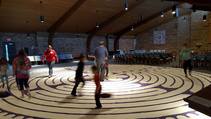
"the heart of the matter!" -- relationships, connectedness; and social cradle . . .absolutely critical to healthy development.
as clinicians, our focus
is on addressing what is hopeful, healthy, and meaningful for you as an adult, a parent, a child -
as a traumatized child.
or a young adult in contemporary life with a traumatized inner child,
someone with repeated trauma.
to do that accurately, we focus
on accuracy, and breadth
- seeing you within the multiple contexts in which we live, and seeing you over time.
- including the interpersonal context of family and friends and perhaps 'carers', who support, comfort and nurture you, especially those easing the daily burden of care of infants and young children, often by supporting the infant's parent, -- these supporter are often referred to as a parent 's "social cradle".
Social cradle is one of the critical things lost when young families migrate or are forcibly displaced/migrated . . . it is that which supports, buffers and protects, nurtures, shares/eases the burden of care, and fosters hopefulness . . . when it "has fallen away" and the mother, in particular, is left bereft of nurture and support - this is reflected in her difficulties in the new location, and is known to often psychologically and literally increasing an inability to nurture and care for her first newborn in the new country (hospital research, Paris, France) (what this looks like, for example, is a young migrant mother who has successfully nursed her first child, but cannot produce milk for her second infant, a newborn, who is born in the new, very alien, country).
In somewhat the same manner, 'social cradle' also seems to dwindle and evaporate when a family finds itself in the throes of high conflict, domestic violence, separation; divorce . . .
and so, there are interesting ways in which context can be a critical, primary consideration in the diagnosis, assessment, and treatment of mother-infant dyads, preteens, adolescents, teens and families - and when working clinically with families who have limited access to quality treatment -- who may have children in low-income schools, may be in situational distress, family members in inpatient or outpatient settings, community mental health settings;
and context is also stressed when parental roles change drastically, such as when parents choose to become students again, engage in stressful graduate school training settings, etc.
the absence of supportive social cradle in fragile contexts is often overlooked.
in the case of those with other even more drastically limited financial resources: those in recovery settings, those who are homeless, in shelters, those migrating, who are stateless such as refugees and asylees, those in out-of-home, temporary, placements; the chronically, severely mentally ill and their children, those attempting to separate or divorce in dangerous situations without financial means to support themselves and their young children . . .
connectedness matters. relationships matter! at abbey, -- we use a relationship-based, integrative model of precision treatment, one which, while focusing on the client, encompasses the entire family, and extended family.
**
Dr. Jay and Dr. Marilee have rich, extensive expertise as compassionate clinicians: not only trained and well-practiced in the scientist-practitioner model. but also draw from strong and broad experience integrating our knowledge and experience and flexibly engaging children along with their parents and extended families, caregivers, collaborating with them and co-creating new narratives, instead of reliving the old stories in therapy.
Dr. Livingston has been in practice thirty years in Silicon Valley and Monterey Bay, Dr. Ruebsamen was a special education teacher for fourteen years, and a licensed clinical psychologist for twenty years. Together,they have practiced long enough to appreciate, and have strong expertise in, weaving together science and practice in every aspect of professional work; applying sound developmental theory to clinical interventions for children and youth as clinicians, professors, instructors and supervisors in APA approved doctoral programs, hospitals, public and private schools and agencies, jails, and correctional settings.
as clinicians, they integrate a diverse, healthy range of service provision: both psychologists have been active with migrating, global families for over twenty years. They continue advocacy and treatment as the multiple aspects of the related crises deepen in the US and on our borders. . . part of this included continuing teaching and training, providing therapeutic services in the SCC women's jail and state correctional facility where dr. jay provides evaluation, therapy and re-evaluation for Death Row inmates, remaining active in other forensics, consulting to and with attorneys, primarily on high conflict and domestic violence related cases involving children, reconnection, reunification therapies, providing clinical developmental perspectives, giving expert testimony in psychological assessment, family law, effects of domestic violence on children.
They keep themselves available to agencies, private clinicians and psychology students, assisting with program development, collaborating with colleagues on specific projects, advocating funding for and access to US and global quality, precision health and mental health services - targeting those invisible populations who cannot afford representation, consultation, or psychotherapy.
global health, mental health: they are committed to increasing safe access to quality health/mental health services and reducing disparities for children and families in the US and around the world - through their global nonprofit, always be listening global initiative 501(c)3 alwaysbelisteningglobal.com
enhance skills and expertise continually, providing and acquiring training in evidence-based, precision methods and practices - providing trainings for local, county, national/international professional organizations, consulting to through local, regional and national agencies for other clinicians, health/mental health workers, educators, judicial councils and attorneys, at times sponsored by law schools or the United Nations.
as professors and clinicians, dr. Jay and dr. marilee have developed treatment programs and modified existing programs to meet the needs of children, teens and families requiring low or no fee services, as Clinical Directors of treatment or recovery programs, inpatient and outpatient medical settings, and in private, public, and parochial educational settings.
They have built upon being thorough, thoughtful clinicians, consultants, precise, accurate psycho-diagnosticians, expert providers of clinical and forensic psychological assessments and trauma and assessment- informed, personalized interventions.
As invited speakers and presenters regarding vulnerability and trauma, complex trauma, child and adult refugee issues, and related psychological issues such as the effects of forcible migration, multiple loss, chronic grief and terror, and the immense burden of post-settlement stress in the receiving country. they share the results of their work, collaborate with colleagues and students/former students, at local, regional, national and international conferences.
clinical research, writing, trainings, workshops, and presentations: dr. livingston and dr. ruebsament recently collaborated on an edited volume (with psychiatrist Daryn Reicherter, M.D., Stanford Psychiatry, and Dr. Seta Patel, Ph.D., Palo Alto University on the clinical treatment of adolescent recent refugees.
with significant clinical research and doctoral level instructional experience and expertise, the drs. are subject matter experts in the following, and other areas of Psychology, Mental Health, and Global Mental Health:
- lifespan development and family dynamics, including multicultural, country-specific, socio-cultural and religious issues
- developmental psychopathology; child psychopathology and the treatment of children and youth
- adult psychopathology
- effects of early child trauma and loss, (including child maltreatment, sexual abuse of children, physical, neglect, psychological/emotional, exposure to high conflict and interpersonal, intraparental violence (domestic abuse)
- child psychological assessment (including trauma assessment)
- adult psychological assessment; cognitive, personality, psychodiagnostic, trauma assessments, etc.
- child treatment; adult treatment; readiness, gifted, cognitive, personality, psychodiagnostic, trauma assessments, etc.
- ethics
- significant, direct and substantial supervisory expertise, with institutions, agencies, and privately
- creating and supervising institutional and field practicums
- advanced institution and field practicums
- individual and group supervision
- case consultation, adult and child; family
- trauma assessment practicums
- advanced field assessment practicum supervision
- interviewing children in conditions of hardship and adversity
- teaching others effective child, adolescent interviewing
- forensic psychology, including forensic assessment
- Second Opinion reviews
- the nature, effects, assessment and treatment of violence exposure and other adversity on children,
- psychological assessment- informed interventions which are trauma sensitive and responsive.
- serving children, youth, families
- innovative Field Program Development, administration, and supervision.
- providing psychological services across ethnic, sociocultural, economic, linguistic, socio-politico, socio-religious and gendered international boundaries and borders
- enacting clinical services through trained indigenous field workers in global settings
- working collaboratively with other mental health, health, community, faith providers.
they have created innovative therapeutic programs, directed and supporting many of them with numerous, sequential grants. This includes funding school-based programs for violence exposed latency aged children in Santa Clara and South County in Northern California. As well, we conduct Second Opinion forensic reviews,
they have conducted clinical research regarding and developed clinical programs for various underserved high conflict and violence-exposed children in differing settings, where they trained and supervised doctoral interns providing psychological assessments, individual & group treatment (including wellbeing and violence-exposure groups for latency-age children), parent-child treatment) for violence-exposed children.
through abbey, private practice, they have consistently chosen to work with formidably complex and complicated cases -- and as court-appointed child or parent assessment and treatment providers.
Juvenile Dependency Court (Superior Court of Santa Clara County (since 1986, Dr. Livingston) provides opportunities for assessment and/or therapy for children and youth, parents, families, as appointed by judges, They work in in Family and other Court divisions in Santa Clara County, Alameda County, Monterey County, Santa Cruz, Napa, and other more remote CA counties.
Their conceptualizing stems from a generous and fluid, theoretical framework which includes the recursive (interactive between each pair of people) as well as the transactional (overall dynamic (between all family members) aspects of "family" -- encompassing the multiple contexts of life, living and loving.
Their thinking about clinical theory is challenged and enriched by their global humanitarian work with war/armed conflict affected children, refugees, asylum seekers with whom they have engaged - both global and US clinicians, educators, and attorneys, and through global associations developed through collaborating with human rights colleagues.
Their thinking about global issues and policies affecting the wellbeing of the children, youth and the families served is richly informed by what they've learn of global health and mental health needs and trends working in their international humanitarian project for children and families:
always be listening global initiative 501(c)(3) (see alwaysbelisteningglobal.com)
abbey mission statement
we are persuaded of the immense US and global need to provide more precision, innovative, effective, research-supported rapid, accessible, affordable health/mental health services for those most vulnerable -
- the youngest children and their siblings, parents/caregivers,
- children and parents in acute need of mental health assistance but without means of procurring therapy
- children whose well-being is threatened as parents cannot afford legal direction, personal therapy, psychotherapy nor adequate, informed legal representation and specialized expert child psychotherapy especially in a setting where the other parent engages in continual provocation, harrassment, threat, and/or interpersonal violence, symbolic violence, and/or economic abuse in the interest of gaining custody.
- those who are pregnant or with infants who urgently need examination and potential medical treatment.
- the oldest and most frail individuals.
- those in imminent, life-limiting danger - who are in physical, medical, life-limiting situations (parent, child, or both).
- hearing their voices above all theory and protocol
- listening more accurately to the needs of children and vulnerable others
- through varied (often symbolic) means by which they naturally, comfortably communicate (such as by expressive art, music, dance; their writings, other thematic content which they choose to introduce through play and behavior).
You, who are on the road Must have a code
That you can live by.
And so -- Become Yourself
Because the past Is just a good-bye
Teach your children well
Your father's hell did slowly go by
And feed them on your Dreams
The one they pick The one you'll know by
Don't you ever ask them why
If they told you you would cry
So just look at them and sigh
And know they love you.
And you of tender years Can't know the fears
That your elders grew by
And so please help them with your youth
They seek the truth before they can die
Teach your parents well.
The children's hell will slowly go by
And feed them on your dreams
The one they pick The one you'll know by
Don't you ever ask them why -
If they told you you would cry
So just look at them and sigh And know they love you.
Teach Your Children, Crosby, Stills, and Nash. Released, 19
That you can live by.
And so -- Become Yourself
Because the past Is just a good-bye
Teach your children well
Your father's hell did slowly go by
And feed them on your Dreams
The one they pick The one you'll know by
Don't you ever ask them why
If they told you you would cry
So just look at them and sigh
And know they love you.
And you of tender years Can't know the fears
That your elders grew by
And so please help them with your youth
They seek the truth before they can die
Teach your parents well.
The children's hell will slowly go by
And feed them on your dreams
The one they pick The one you'll know by
Don't you ever ask them why -
If they told you you would cry
So just look at them and sigh And know they love you.
Teach Your Children, Crosby, Stills, and Nash. Released, 19

